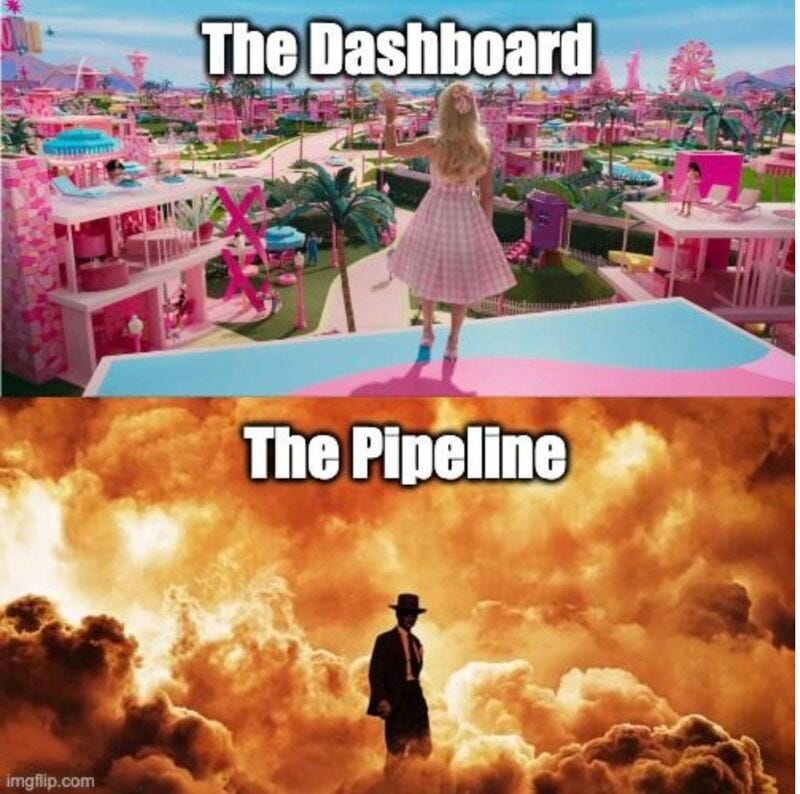Unlock Career Success: Master the Art of Explaining Your Data Engineering Role
Practical tips on explaining what you do to a technical and non-technical audience
Can you articulate the value you bring to the business?
Do you struggle to explain your role to everybody?
If so, you're not alone. Data roles are complex. They involve intricate tools and processes that are challenging to convey.
Yet, quality communication is an essential element in your career. Your role exposure is often the first impression people will get from you. People may decide whether to listen to you based on these few sentences.
But fear not!
This post will equip you with the skills to demystify your job and captivate any audience. You will learn what to consider and what key points to mention. I will share the exact formula for you to use next time somebody asks you what you do for a living.
Read time: 6 minutes
The Plan
Do you want to know a secret?
When people ask me what I do for a living, I reply with a prepared answer. I avoid rambling and sound confident. I look like I know what I am doing, even if that is false.
Your job description must be clear, concise and engaging. You need to sound confident and inspire trust. To achieve that, you only need three key points:
How do you help the business
What tools and processes do you use
What challenges you have
But wait, there's more!
Can you always explain your job the same way?
For sure!
But the truth is that people with different backgrounds need different contexts. Before explaining, you should gauge your audience's tech level. Then, you need to adjust your jargon.
For this article, I picked three very different personas. To make things easier, I will give you the exact answers I used in my data engineering days. Feel free to steal them!
Explaining Your Job to Software Engineers
Your software engineer: Ryan has six years of experience in web development. He uses Ruby on Rails, React, and PostgreSQL daily. He also understands cloud and infrastructure but knows nothing about business KPIs.
You can explain to them how data engineering is software engineering. Here's what I used to say when I was a data engineer:
As a data engineer, I help the business by building the data infrastructure. This infrastructure powers our analytics and data-driven applications.
I use software engineering tools and best practices, such as text editors, code, CI/CD, and testing. I also use more specific tools, including distributed processing frameworks like Apache Spark, workflow orchestration tools like Airflow, and data warehouses like Snowflake.
One of the challenges I face is ensuring data pipelines are reliable and performant at scale. And evolving the platform to support new sources and use cases is even more challenging.
This description shows that data engineering is a variation of software engineering. Here, you can discuss tools and processes closer to Ryan.
Let's get more abstract.
Explaining Your Job To Business Stakeholders
The persona for this example is Sarah, the Chief Marketing Officer at your company. Sarah has 23 years of experience in marketing. She understands her team's tooling and helped define some KPIs. Sarah knows nothing about programming or cloud infrastructure.
Coding or infrastructure won't capture your CMO's interest. When Sarah asks about your job, she wants to know if you can help with her goals. Here is what you can tell to a SMT member like the Chief Marketing Officer:
As a data engineer, I ensure your team can access the data you need to make informed marketing decisions. I build the data infrastructure to collect, process, and store data from Salesforce, Google Ads, Hubspot, and our website.
I integrate these disparate data sources into a centralised data platform. I apply data quality checks, transformations, and governance processes. This ensures that the data available for reporting and analysis is accurate and consistent.
A reliable and scalable data foundation enables the analytics team to build comprehensive marketing reports and models. As a result, I empower your team to gain insights into customer behaviour and marketing ROI.
See what we did here?
Instead of focusing on your tasks, you put Sarah's needs in the centre. That way, your CMO sees you as more than a tech nerd—she sees you as a trusted partner.
Now, explain your job to a muggle who sees computers as magic.
Explaining Your Job To Non-Technical People
Imagine you are talking to your aunt, Jackie, who is a nurse. She has spent her entire life in the hospital. Aside from browsing social media on her phone, your aunt knows little about modern tech.
As a nurse, Jackie has zero doesn't care about tech, but as your aunt, she cares about you. So, when talking to Jackie, you should explain things on a high level. I recommend going with some real-life abstractions:
Imagine a hospital with different computer systems for electronic health records, medical imaging, patient monitoring devices, and billing. These systems generate a massive amount of data every day. I connect these different data sources and automate the data extraction, cleaning, and organisation.
I can collect data from patient monitors, remove inaccurate readings, and store the data in a database. This allows doctors and nurses to track patients' vital signs over time and identify potential issues early.
As a data engineer, I'm like a plumber for data in the hospital. I ensure water flows from the source to every faucet and drain. I also provide data flows from hospital systems to the people and applications that need it.
I enable the hospital to use data to improve patient care, streamline operations, and make data-driven decisions. Like a plumber needs to fix leaks and clogs, I need to troubleshoot issues and optimise data flows to keep the data infrastructure running.
From my experience, Jackie will find that description approachable. Your aunt may still feel confused. But at least she can ask questions using an abstraction she understands.
Conclusion
Mastering the art of explaining your data engineering role is a career-defining skill. By tailoring your language to your audience, you can communicate the value you bring.
You need to make your explanation clear, concise and engaging.
Remember, practice makes perfect! Refine your explanations, seek feedback, and improve. Who knows, you may learn something new about your job.
Now, it's your turn! Explain your role in the comments below or send them to me. Let's learn from each other and unlock collective career success!
Picks of the Week
Andreas Kretz wrote an outstanding article and filmed an even better video about becoming a senior data engineer. (link)
Is senior not enough? Follow this guide from Anton Zaides on becoming a manager. (link)
Everybody talks about data products nowadays. Yet, everybody has a different definition. I like the one from David Jayatillake. (link)
How Am I Doing?
I love hearing from readers, and I’m always looking for feedback. How am I doing with Data Gibberish? Is there anything you’d like to see more or less? Which aspects of the newsletter do you enjoy the most?
Use the links below, or even better, hit reply and say hello. I’d love to hear from you!










I always get stuck while explaining my job rule and a data engineer.